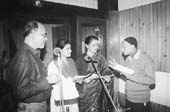 |
| A still from the documentary, Spirit of the Graceful Lineage |
Stereotypes abound in Indian cinema, none more so than the weepy bride who must reconcile herself to the thought of leaving her family just so that she can become part of another. Prerona Barbarooah Sharma’s Spirit of the Graceful Lineage turns this custom-defined gender inequality on its head through an evocative documentation of a Khasi wedding, one in which the groom — laugh aloud, feminists — must weep.
Winner of the 2005 national award for the Best Anthropological Documentary, Prerona’s film is entertaining as much for its novelty — at least to those unacquainted with the nuances of Meghalaya’s matrilineal society — as for the conscious effort to go beyond the mechanics of a documentary.
Sample this: the groom breaks down when the time comes for him to leave the house that has been his home for 26 years. His family, especially his parents and sisters, cannot stop the tears either. Cut to the bride’s house, wh-ere the mood is in stark contrast to the one in the groom’s place. If you like your celluloid brides coy and a tad confused whether to cry or smile, go check out a Hindi film.
The bride in Spirit of the Graceful Lineage goes around inspecting preparations for the wedding ceremony, interspersed with moments of laughter with family members and guests. She is jubilant and why not? It’s not in every society that a groom comes to the bride’s place to marry and stays back!
Prerona’s 35-minute film is not just a celebration of the existence of such a unique social system, but also a fine cinematic exploration of rituals pertaining to the cycle of life itself — birth, marriage and death — and the role womenfolk play in it.
A couple of short but revealing interviews complement the supporting visuals. The director also smartly introduces viewers to the Khasi system in which the youngest daughter of the family (khadduh in the local language) becomes the custodian of the ancestral property and the person responsible for the well-being of the other members of her family.
Flawlessly shot by Debashish Bharadwaj and edited by Diganta Thakur, Prerona’s film contains a haunting background music score by Sher Choudhury. More than anything else, the documentary reflects Prerona’s research-based approach and sensitivity to traditions. Producer Bibi Devi Barbarooah and executive producer Himangshu Shankar Sharma deserve kudos for financing such a venture.










